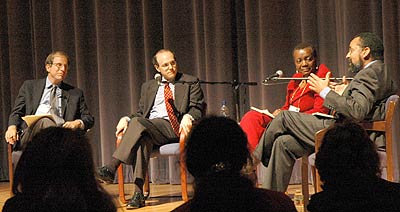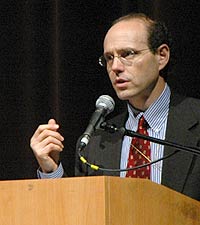UC Berkeley Web Feature
 |
Left to right: Michael Krasny, Jason DeParle, Cheryl Polk and Christopher Edley, Jr., debate the plight of America's poor. (BAP photos) |
Boalt's Edley, NYT's DeParle lead discussion of next steps for welfare reform
BERKELEY – When then-Arkansas Gov. Bill Clinton pledged in a 1991 campaign speech to "end welfare as we know it," few would have believed how many millions of (mostly) women would leave the welfare rolls in favor of low-income jobs. But are they - or we, as a society - better off as a result of welfare reform?
That's the question New York Times social-policy reporter Jason DeParle set out to answer in his new book, "American Dream: Three Women, Ten Kids, and a Nation's Drive to End Welfare," as well as to debate in a forum on poverty and politics held at Berkeley's Wheeler Auditorium Monday night (Oct. 18). And the answer? Not really.
Subtract transportation and child-care costs from their wages, and most former welfare recipients end up with less money than they had before welfare reform. Their work was supposed to serve as a "role model" for their children; but that has not been shown to have as much of an effect on juvenile delinquency as have their long, daily absences from home. And most heartbreakingly, most former welfare recipients are no closer to breaking out of poverty.
For "American Dream," DeParle paints an intimate group portrait of Angie Jobe, Jewell Reed, Opal Caples and their combined 10 children as they move from Chicago to Milwaukee in search of better welfare benefits, only to become some of the first subjects of Wisconsin Gov. Tommy Thompson's experiment to curtail welfare. At the same time, DeParle traces the women's lineage to a common ancestor, a slave named Frank Caples, and the Caples family's hardscrabble lives as sharecroppers on the Mississippi plantation of Sen. James Eastland, one of the most repugnant segregationists of the 1950s. While DeParle stops short of saying that this oppressive family history has predetermined the lives of the Caples descendants, he does make some interesting comparisons between sharecropper culture and that of modern low-income, inner-city residents.
Both have narrowly circumscribed "opportunity structures," DeParle said, with little chance of class advancement. And welfare reform, while successfully shifting people to work, has done little to change that, he said. The idea was that "once the country stopped unloading on freeloaders, once you got rid of that ugliness and anger from politics, and stopped yelling at people to get off welfare, you could start a much more positive, healthy, progressive conversation about how to help low-income workers," DeParle explained. "The first part of Clinton's idea came true: it's removed the anger from the conversation about poverty, but it's also removed the conversation about poverty."
—Jason DeParle |
Monday night's forum sought to rectify that lack of discussion. DeParle was joined by Christopher Edley, Jr., the new dean of UC Berkeley's School of Law (Boalt Hall), and Cheryl Polk, director of the Miriam and Peter Haas Fund, for a broad-ranging conversation moderated by KQED host Michael Krasny. Edley and Polk brought viewpoints steeped in national and local policy, respectively. Edley, a longtime Harvard law professor, worked for several presidents on domestic policies, including affirmative action, and is a cofounder of the Civil Rights Project, a multidisciplinary research and policy think tank. Polk, as head of the Haas Fund, supports early childhood programs in San Francisco, and is a clinical child psychologist who also consults with numerous child-care centers, social service agencies, and foundations.
The discussion concentrated on figuring out why the American dreams of Angie and DeParle's other subjects were so circumscribed, with such "low ceilings" as Krasny put it, and on what could be done to raise them. Polk ascribed the failed opportunity structure to a lack of inner-city role models, observing that integration had enabled those blacks who reached the middle class or higher to flee to the suburbs. "Some children never meet people in their neighborhood who've been to college, who've achieved anything," she said. "The most they can aspire to is the best in their own neighborhood," and often, that dubious honor belongs to drug dealers.
For his part, Edley believed that the root of the problem was a failure in America's K-12 public education system. Once upon a time, he said, an eighth-grade education could secure a job that would enable a reasonably middle class life. Then the requirements became a high-school diploma, and now, a college degree. Without an education foundation laid early in life, low-income children would never be able to break into the middle class.
What we needed, Edley said, was a "real revolution in our public education system. Why haven't we been able to accomplish that? . I think these opportunity questions have been racialized in America. I expect that people find it difficult to care across lines of color, and that they believe in the stereotypes about people of color who congregate in these categories."
And while DeParle's book made excellent strides toward dispelling such stereotypes, Edley argued, it still made the mistake that irritated him about politicians from Ronald Reagan to Bill Clinton: trying to base social policy ideas on anecdotes. "I am really torn, because as powerful and valuable as I think the book ["American Dream"] is, there's a piece of me that says, 'Wait, I'm being invited by Jason to make judgments about welfare policy on the basis of anecdote. Incredibly detailed, rich anecdote, but it's still anecdote," Edley said.
In response, Krasny asked the group to posit their ideal welfare bill for the current environment. DeParle referred to one of the things that had surprised him while writing his book - that welfare reform had been very successful in helping women to join the workforce, but not men. "Employment programs for low-skilled men are about 20 years behind those for women," he claimed. "My dream would be to raise the earnings of low-skilled men and help them reconnect with their kids."
Polk said any new welfare bill should seek to address the reality of low-income jobs for former welfare recipients by fully funding their child-care needs, which would have the added benefit of keeping their children safe. She also thought that, in order to improve the type of jobs low-income people could get, welfare should include educational benefits as well.
For his dream welfare bill, Edley returned to his criticism of DeParle's book, saying he wished for "a conveyor belt that would take the best research possible and transmit it to policymakers" so that they could make decisions that were not driven by sound bites or "journalistic suppositions about what would make a difference."
With centers like the Brookings Institution's Welfare Reform & Beyond Initiative churning out blue-chip studies weekly, a lack of research is not the problem, DeParle gently reminded Edley. "It's whether there is an audience for it."
Related upcoming events:


